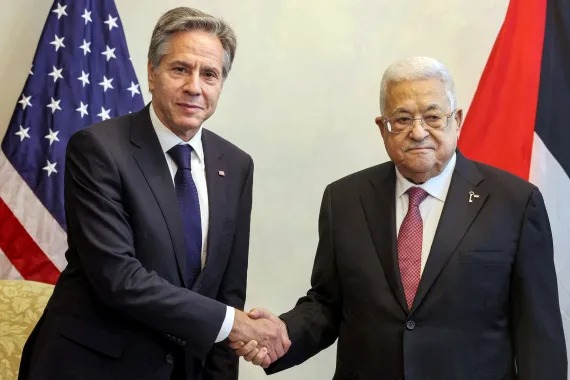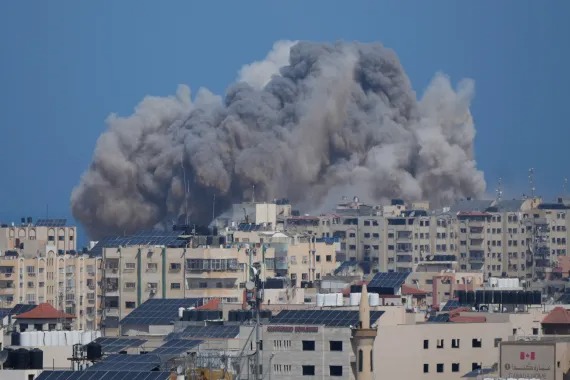In a high-stakes meeting held in the heart of Jordan’s capital, Amman, Palestinian President Mahmoud Abbas delivered a resounding rejection of the forced displacement of Palestinians from Gaza. His words came in response to Israel’s recent order for all civilians in the Gaza Strip to relocate to the south, a directive that has raised alarms and stoked tensions in the region. President Abbas, with a firm resolve, likened such a development to a “second Nakba,” evoking memories of the mass displacement that occurred during the 1948 war surrounding the creation of Israel. He also called for the immediate establishment of humanitarian corridors to avert a looming humanitarian catastrophe.
Palestinian President Expresses Strong Opposition
President Abbas’ unyielding stance against the forced displacement of Palestinians from Gaza took center stage during his meeting with the United States Secretary of State, Antony Blinken. He articulated his deep concerns, emphasizing that any such forced evacuation would not only result in a grave humanitarian crisis but also be a painful echo of the past. The Nakba, or “catastrophe,” refers to the displacement of hundreds of thousands of Palestinians during the creation of Israel, and Abbas’s use of the term sends a clear message about the gravity of the situation. Humanitarian corridors, he stressed, are the need of the hour to prevent a devastating crisis from unfolding.
Blinken’s Diplomatic Mission in Jordan
Antony Blinken’s presence in Jordan was not solely to advocate for a cessation of hostilities but also to facilitate negotiations on several pressing issues. Blinken, the top U.S. diplomat, is on a regional tour that includes stops in Qatar, Saudi Arabia, the UAE, and Egypt. A primary objective of this mission is the release of American captives currently held by Hamas. Furthermore, Blinken aims to negotiate the safe evacuation of 500 to 600 U.S. citizens or dual nationals who are currently in Gaza. His diplomatic efforts are geared toward preventing a regional escalation of the conflict, although the immediate cessation of hostilities is not on the agenda. He reiterated that the U.S. is not advocating for Israel to halt its actions against Gaza.
Jordan Calls for Humanitarian Aid Amidst Rising Tensions
As the crisis in Gaza intensifies, King Abdullah II of Jordan lent his voice to the growing concern. Following his meeting with Secretary Blinken, King Abdullah called for the creation of humanitarian corridors, urging the entry of urgent medical and relief aid into Gaza. He also emphasized the importance of safeguarding civilians and ending the escalation of the conflict. This statement underscores the growing international concern regarding the humanitarian situation in Gaza, which has deteriorated significantly as the conflict continues to rage.
Meanwhile, thousands of demonstrators took to the streets of Amman to express their support for the Palestinian cause. Over 10,000 people gathered near the Grand Husseini Mosque, brandishing banners proclaiming their solidarity with Palestine. In response, a heavy police presence was observed, and police forces deployed tear gas to prevent approximately 500 demonstrators from reaching a security checkpoint near the main border crossing with Israel. Jordan, with a substantial Palestinian population, fears that an expanded regional conflict arising from the Israel-Hamas war could have far-reaching implications for the country.
The conflict in Gaza continues to escalate, with Israel engaged in an intense campaign to “destroy” Hamas, the governing authority in the Gaza Strip. Recent events, including the infiltration of Palestinian fighters across the southern border, have resulted in a death toll exceeding 1,300. The Israeli military has conducted relentless airstrikes in the Gaza Strip, with the startling revelation that 6,000 bombs have been dropped since October 7. To put this number in perspective, it nearly matches the quantity of bombs used by the U.S. in Afghanistan over the course of an entire year, despite Afghanistan being nearly 1,800 times larger than the besieged Gaza enclave. As tensions rise and international concerns grow, the need for a swift and peaceful resolution becomes increasingly urgent.
















